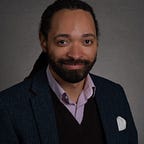Recap: 2019 HIMSS MD Lobby Day in Annapolis
On Thursday 31 January 2019, ~75 members of the Healthcare Information and Management Systems Society (HIMSS) of Maryland converged on Annapolis to meet and greet Maryland state representatives¹ and share stories about policy.
Health and Government Operations Committee chair Delegate Shane Pendergrass even took the podium for a few minutes to share the committee’s work on NextGen EMS.²
Telemedicine
The de facto policy focus of the 2019 lobby day was telemedicine.
The “10,000 foot view” potential of telemedicine, as distinct from the broader concept of telehealth, was presented by Dwight Raum (Johns Hopkins University CTO) and Aalok Shah (JHU inHealth Initiative).
The limits of current law and strategies for revising the law were presented by Sally McMillan-Guy (JHU Associate Director of State Affairs).
Several on-going case studies were presented:
- Elementary school telemedicine available from school nurses’ offices in a dozen schools in Howard County, presented by Diann Rocha (Nurse, Ducketts Lane Elementary School) and Sharon Hobson (Howard County Health Department);
- Pediatric telemedicine consults for families in rural Southern Maryland, to minimize commuting to the region’s major medical centers in Baltimore and DC; and
- Substance abuse telemedicine consults for individuals in Western Maryland.
What unifies these applications is that they occur within a local medical facility and not at home. Home telemedicine consults outside of very specific bounds, e.g. the patient is bedridden or disabled, are not reimbursable.
Prescription Drug Monitoring Program (PDMP)
The evening closed with a panel.
One of the topics discussed was the Prescription Drug Monitoring Program (PDMP). Prescribers and pharmacists in Maryland are required to look up patients in the PDMP. This sounds fine on paper, but what about the IT requirements, which fall upon CRISP Maryland, the state’s Health Information Exchange and maintainer of the PDMP?
For example, under current law, a pharmacy technician may serve as a delegate for their supervising pharmacist. But, what happens in an emergency department setting where there may not be a clear 1:1 relationship between delegates and prescribers? Do you hold the prescribers in violation of Maryland law for not being able to “prove” they accessed the PDMP before prescribing? Do you hold up a patient’s treatment until the prescriber can authorize through PDMP? These are not simple questions, but the assembly is considering legislation to allow group delegation in hospitals.
Nicole Majaeski of the the Maryland Healthcare Care Commission pointed out that the MHCC Electronic Presciption Records System Workgroup has been tasked by the legislature with studying a state-wide registry of non-controlled substances, modeled on the PDMP. The privacy concerns are numerous. While the state may have a compelling interest in monitoring controlled substances, why should data on my prescriptions be logged to a central registry? There is no such thing as anonymized health data; all sorts of health information can be inferred from a list of prescriptions.
Takeaway
While HIMSS Maryland did not appear to lobby for or against specific pieces of legislation during the lobby day, the disparity in access between well-funded industry groups and constituents was staggering.
Private-sector interest groups, including HIMSS, pay tens of thousands of dollars to host lobby days, hundreds of thousands to contract lobbyists,³ and millions to maintain their own state affairs offices.⁴ What is good for HIMSS members such as Johns Hopkins (1/3 of the agenda) is not necessarily good for people of Maryland.
It was no great surprise that moneyed, concentrated interests, with whom legislators interact daily, trumped the diffuse interests of constituents. The needs of Upton are far more pressing, to my mind, than those of HIMSS; but, it is the HIMSS voices who pay to be heard.
Footnotes
¹ State Delegate Susan Krebs and State Senator Cheryl Kagan were also in attendance.
² Earlier that afternoon, the Health and Government Operations Committee heard two hours of testimony on the NextGen EMS proposal [video].
³ The lobbying firm Alexander & Cleaver is paid to represent the interests of MD HIMSS (“Government Relations Consultants”: Richard Reinhardt, Davion Percy and Barbara Zektick). See the full list in“Listings of Registered Lobbyists.”
⁴ Johns Hopkins employs a dozen policy affairs personnel, split roughly evenly between state and federal affairs.
